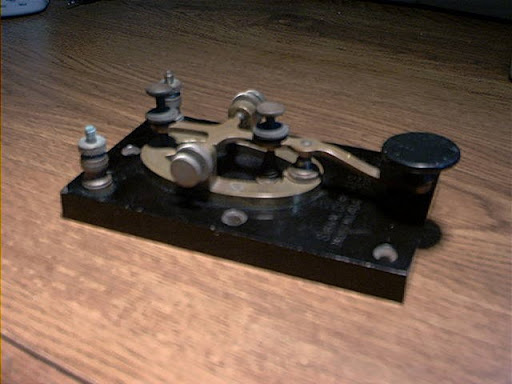
This guy has the perfect name for Day 26, that’s for sure.
Dr. Benjamin Franklin Royer sits in his office in Harrisburg, Pennsylvania. The sign on his desk reads: “Pennsylvania State Health Commissioner.” During a fast-flowing 26th Day of influenza, Dr. Royer directs his assistant to type a message. In a few minutes the message will be converted into a telegram. Seconds later, with click-click-click and rat-a-tat-tat, the telegram arrives simultaneously at an office in every town in Pennsylvania.
The telegram’s content: close all sites of public amusement immediately.
Clear. Stark. Urgent.
The telegraph and telegram would have thrilled Dr. Royer’s namesake—Dr. Benjamin Franklin. Franklin holds a legendary position in Pennsylvania and American history as a leader in innovation, in experimentation, in bending science and discovery to address the needs of people in their daily lives. He was gifted in sharing big ideas in a few words.
Dr. Royer’s telegram is an effort to address the daily lives of people, too, and he does it today in a few words.
While Royer’s telegram flashes across Pennsylvania, the medical professionals who write and print the Boston Medical and Surgical Journal are, on this same day of October 3, 1918, publishing longer reports and in-depth articles on influenza. The quick reader, though, can boil the information down to five words:
“The situation has become serious.”
Drastic actions and deep-impact measures are nearly everywhere today in the United States. The schools, churches, theaters, and pool halls shutter in Philadelphia. All public meetings are banned in Oklahoma City. The New York Stock Exchange begins its new schedule of business for the foreseeable future, opening only for half-days of trading. In Minneapolis newspaper editors worry about the reality of having so many local doctors and nurses away in the World War. Nationally, one of three medical professionals are gone on military service. The crisis breaking around them almost every hour of this day is not the time to be shorthanded.
Regardless of whether your realm is military or civilian, influenza often is the defining feature of your life today. Camp Meade, Maryland has 700 new cases of influenza and 99 new cases of pneumonia; 34 die today. Native American reservations in the Plains states groan under the illness. In the small town of Baldwinville, Massachusetts, with 1500 or so residents, half of the population is sick.
A former resident of the same county as Baldwinville (Worcester County) worries about the mental strain on all the people of Massachusetts. Governor Samuel McCall fears that people can’t take it much more—can’t cope with the crushing burdens and crashing disruptions in the new daily life of Massachusetts’s citizens. So troubled is McCall that he is considering this day a new announcement: lifting temporarily the ban on Sunday “autotouring”, the popular new habit of people riding in cars to visit sites and friends and family on their day of rest. Ten years ago and hardly anyone had these transportation innovations. McCall wonders if everyone simply needs fresh air, some sunshine, and a short time outside to remind them of what life really is. Maybe the car is the best way to give them that chance.
McCall’s counterparts in Charleston, South Carolina aren’t as troubled. At least not all of them. The political and economic leaders here are holding their Liberty Loan parade today, as had occurred in Philadelphia a few days ago. Similar scene with packed crowds in small spaces. Charleston’s schools are still in session as well—but teachers are told to send sick students home as quickly as possible. Finally, Red Cross members in Charleston believe life will change any hour for the worse. Their meetings revolve around what to do locally in an epidemic. Life is bending in the historic city on Charleston harbor.
The wires of today carry another message. A telegram traveling under the Atlantic Ocean. It prints on a sheet of paper carried to the White House, to the desk of President of the United States Woodrow Wilson, POTUS #28. Through pince-nez glasses perched on the bridge of his nose, Wilson reads the following words:
“Berlin, October 3, 1918
The German government requests that the President of the United States of America take the initiative in bringing about peace, that he inform all the belligerent states of this request, and that he invite them to send plenipotentiaries for purposes of beginning negotiations. The German government accepts as the basis for peace negotiations the program stated by the President of the United States in his speech to Congress of January 8, 1918, and in his subsequent pronouncements, particularly in his speech of September 27.
In order to avoid further bloodshed, the German government requests the immediate conclusion of an armistice on land, at sea, and in the air.
Signed: Max, Prince of Baden
Chancellor”
Aware of influenza but far, far more focused on the World War, Wilson leans back in his chair and thinks about tomorrow.
A thought for you on Day 26, April 7, 2020, twenty-six days after President Trump declares Covid-19 a national emergency—a move matches a move. Influenza has moved in that it has gotten sharply worse. It starts not-great, then to bad, then again to awful, finally to horrific and hellish and other-worldly. That’s movement. At the same time, the proper way to respond and to react is to follow a similar path of movement—this action which is appropriate, to that action which is more intense, to another way that is yet more intense, and to this other action which is totalistic and pervasive and perhaps overwhelming. Movement following movement. I think here of Governor McCall. He is trying be aggressive, trying to keep pace or possibly even just a little ahead of things. Still, he sees and knows that a breaking point is out there for the people around him. He deals with a largely new reality (cars) that has joined an absolutely painful reality (influenza pandemic). Does the new reality include a potential step forward as well as a potential step backward? The takeaway from McCall might be that, on a frequent basis as our conditions are mired in the low spots, you should look for where a breaking point is with the people near you, the people you can affect, those you lead or help to lead. You should then at least look, too, for the openings in life which could provide relief. There are changes in recent years that might serve as openings you wouldn’t have considered in the past.

(note to reader—I invite you to subscribe to this series/blog. The purpose of my posting in this series is the purpose of my enterprise at Historical Solutions—to explore the past in a new way that brings new and different value to you, both in the present (this minute) and on the edge of the future (what’s ahead or forward of this minute). The past is everything before now, the totality of all time before the present; history is a set of very small slices of the past that, for a particular reason, have been remembered. If you wish to contact me privately, please do not hesitate to text or call 317-407-3687)







